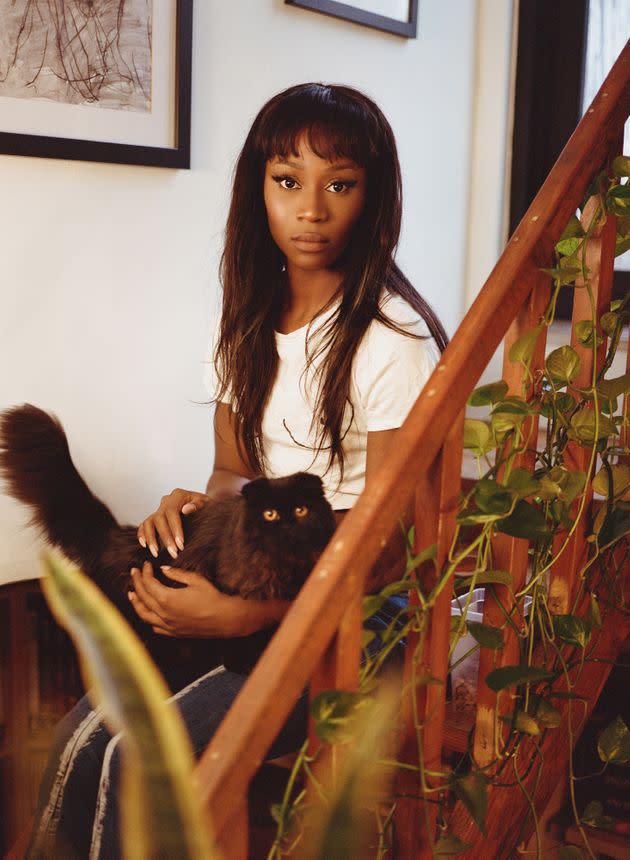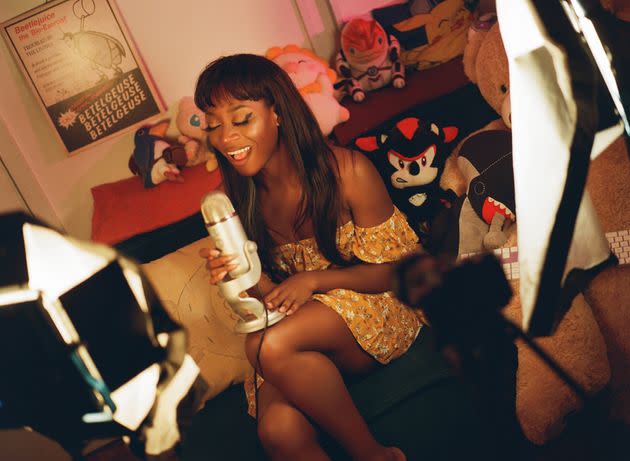I'm A Porn Performer Living With HIV. Here's What Needs To Change In My Industry — And Beyond.

Ashley Lake)" data-caption="Vanniall photographed at home in her New York City apartment. (Photo: Ashley Lake)" data-rich-caption="Vanniall photographed at home in her New York City apartment. (Photo: Ashley Lake)" data-credit="Ashley Lake" data-credit-link-back="https://www.takingsomepictures.com/" />
“When did you come out?” A simple question asked of every queer person, but it’s never been enough to come out just once. You have to come out to every person you meet, in many ways.
I’ve come out as gay, as trans, as a sex worker. I found an accepting home in the sex worker community and the porn industry, working for myself without an agent or manager or boss in a way I never imagined possible, supporting myself and even winning industry awards like Best Trans Clip Artist in 2020.
Telling people exactly who I am was the only way I knew that I could live happily. Each time I came out, I had to find my community and support. I thought that would be it ― I’ve told everyone my big secrets, I’ve let people see me.
But halfway through 2021, I was diagnosed with HIV — and suddenly, I was back in the closet, feeling like a shadowy figure. It felt familiar, almost nostalgic.
But no one should feel that way. Things need to change. Today, I’m coming out, the closet locked firmly behind me, as HIV-positive.
The diagnosis was scary. It was terrifying. For a moment, I had this idea, which I now know is archaic, flashing before my eyes: Am I going to die?
I know now that my chances of losing my life to HIV are zero to none, as long as I have access to modern medicine. A simple two pills a day not only stop the virus from replicating and causing any symptoms but also make it untransmissible. I’ve experienced no side effects and have had to make no life adjustments for the medication.
I had no idea it would be so simple, or that I had already taken one of the pills, Truvada, for PrEP (pre-exposure prophylaxis). My clinic, the Center for Special Studies in New York City, connected me with a doctor (a trans one!) and a caseworker who got me insurance and covered the meds — I’ve paid nothing. I take two pills every night, but there are even one-pill-a-day regimens.
Science will soon make once-a-month or every-two-month injections widely available, or even provide a cure. There were recent headlines about a second person “naturally” cured of HIV, raising hopes even higher.
But my relief upon finding out about the medication didn’t last very long. Even though I had dodged a literal death sentence, my career and means of survival were less assured.
I’d made a living out of my sexuality, and an HIV diagnosis seemed decidedly unsexy.

Ashley Lake)" data-caption="Vanniall with GMO, one of her three black cats. (Photo: Ashley Lake)" data-rich-caption="Vanniall with GMO, one of her three black cats. (Photo: Ashley Lake)" data-credit="Ashley Lake" data-credit-link-back="https://www.takingsomepictures.com/" />
I’m not alone in relying on the adult industry. Black transgender people are highly stigmatized and pushed out of most jobs. Research released by the National LGBTQ Task Force found that 26% of us reported being unemployed, 34% lived in “extreme poverty,” and 41% had experienced homelessness. A 2015 study reported that as high as 40-47% of us have traded sex to survive.
Lack of safety, accessible education and health care hits Black Americans the hardest, with us making up 42% of all new U.S. HIV diagnoses in 2018, according to the Center for Disease Control and Prevention. More than one-fifth of Black transgender people are living with HIV (20.23%) compared to 2.64% of all trans people, 2.4% of all Black people and 0.6% of the general U.S. population.
Sex work is highly stigmatized by banks (which deny us normal financial services like PayPal, forcing us to turn around and get exploitatively high rates through intermediaries). With 1 in 4 U.S. households unbanked or underbanked already, according to the Federal Deposit Insurance Corp., this intersection becomes incredibly important.
Maintaining access to the income we have is essential to POC sex workers’ survival. Sex workers and LGBTQ businesses have long protested discrimination from outside the sex industry, like the #AcceptanceMatters campaign’s protest against new Mastercard policies. HIV+ sex workers experience this discrimination within their own industry as well.
The adult entertainment industry was one of the few places where it felt possible for people like me to survive or actually have a career. I found fans who adored me and respect from my co-workers. I was directing my own feature-length films, controlling my own distribution, and had just started breaking into a mainstream career with major bookings for other studios.
I had carved out a niche for myself, proudly, as a Black trans woman, sexy in my own body. But with my HIV diagnosis, that felt like it was going to come crashing down. All of a sudden, I was dodging texts from talent about shoots and giving generic excuses to major studios I had spent years courting and setting up business with.
I seemed like a flake because I didn’t know what to say — how do you tell someone that months of pre-production are out the window because you’re HIV-positive?
I had so much going on in my head pre-diagnosis. Sets and locations I was itching to play with. Producers and directors I’d been dying to meet. I’d spent months building connections, making sure I had my latest ID and had gotten a passport so I could book international work.
All of that had to be stopped, and I wasn’t sure if those opportunities would come back. It felt terrible seeing everything I had been building toward slide out of my reach. It left me wondering where my place was in the adult industry, or if I even had a place at all.

Ashley Lake)" data-caption="Vanniall talking with fans in her home streaming studio. (Photo: Ashley Lake)" data-rich-caption="Vanniall talking with fans in her home streaming studio. (Photo: Ashley Lake)" data-credit="Ashley Lake" data-credit-link-back="https://www.takingsomepictures.com/" />
The adult industry has some working systems around HIV and some broken ones. The most widely known and basic policy is to test for STIs before shoots.
For busy mainstream performers, this can mean getting tested at official Talent Testing clinics every 14 days. For “trade” shoots, ever more common in an increasingly independent industry, two performers share production costs and distribution rights. For these productions, most performers simply get tested wherever we can afford and show each other the results on our phones.
The existing testing regimen has shown its use outside of HIV ― allowing the industry to quickly adapt to COVID-19, for instance.
Regular testing is important. Getting tested regularly for shoots allowed me to detect the HIV infection almost instantly. I got HIV from an undiagnosed non-sex worker but was able to make sure I didn’t expose another sex worker, a client, or my partner because I knew my status.
You often see news about HIV shutting down porn production, which leads to some people saying the industry is unsafe, but that’s actually evidence that the testing system works. Shutting down sets for days at a time to wait for updated tests shows an industry willing to coordinate like no other for the safety of its workers. As porn performer Charlotte Sartre was quoted in Paper magazine, “In the past 15 years in the U.S., there have been no on-set HIV transmissions, everything’s happened off-camera in a performer’s personal life.”
Testing among non-sex workers is dismally low compared to sex workers, but no one uses shock headlines to report on individual cases in other industries. How many people outside the sex industry do you know who get tested for STIs every two weeks?
U.S. government statistics show that less than half of all U.S. adults ages 18-64 have ever been tested for HIV. Most sexually active adults never get tested at all, let alone 20 or 30 times a year like us. The adult industry’s openness about HIV has been used to stigmatize us, but it’s something we should take pride in.
Unfortunately, prevention and detection aren’t the only metrics, and the adult industry fails on the most important one: supporting people who actually have HIV and must live with it.
Everyone is scared of contracting HIV, but the true stakeholders are HIV+ performers. If you don’t have it, you’re not living with it ― you should be protected but not centered in policy.
Stigma against HIV+ people and LGBTQ folk scares others away from regular testing and medication. The same fear forces HIV+ sex workers away from a safe performing income.
There has been little to no concrete progress.
Even aside from safety protocol, sex workers can be just as scared and misinformed as the general public ― there’s no getting around the fact that stigma means some people won’t work with me and some clients might shy away from my content.
Uneducated fear about HIV is so strong that many studios won’t book male talent for “straight” scenes if they have done any gay or trans scenes, a de facto ban on so-called “crossover” performers regardless of testing status. It’s a myth that bisexual men “spread HIV.” Trans performers are especially stigmatized.
But HIV is just as big an issue in other populations ― 48% of the estimated 1.7 million new HIV infections globally in 2019 were among women and girls, and the low perception of risk among heterosexual men means they now have the highest rate of undiagnosed infections. Heterosexual people generally get HIV from heterosexual partners, not bisexual ones.
These figures make it clear: Stigma against HIV+ people and LGBTQ folk scares others away from regular testing and medication. The same fear forces HIV+ sex workers away from a safe performing income. Stigma helps no one.
We can fight this stigma with education. Modern drugs, called antiretroviral therapy or ART, completely stop HIV from replicating.
That means a person’s viral load can be reduced to “undetectable” levels, staving off all of the late-term health risks we call AIDS, letting people diagnosed with HIV live healthy, normal lives, and preventing any risk of transmission of the virus.
After as little as one week, if HIV is caught quickly on the new drugs, you can be tested and declared “undetectable.” Almost all patients are undetectable within six months. This is also when they are untransmissible. That’s what the U=U campaign educates about ― Undetectable Means Untransmissble.
It may be hard for some people to understand, but someone who knows they are HIV+ and is on medication can be safer to have sex with than someone who just thinks they are negative. If a previously HIV-negative person is exposed to the virus, they may have it and transmit it before it’s caught. They could have levels of the virus that would have been detectable if they’d tested.
Performers with an untransmissible HIV viral load (referred to as U+) can never transmit HIV; there is no gray area of risk. U=U isn’t just about helping U+ performers ― it’s also the most reliable HIV prevention mechanism for anyone who is sexually active, making it a huge benefit to HIV-negative people.
Studies have shown that even missing periodic doses doesn’t stop the drugs from being effective ― so-called “viral blips” may show how sensitive testing is, but don’t indicate transmissibility. It’s best to always take your meds on schedule, but worth being reassured that these edge cases have been studied in depth. It could take several weeks for levels to become detectable after going off medication.
The science is in ― it’s safe to have sex and produce content with HIV+ performers on ART.
For the U.S. porn industry, we already know how to improve our system. Organizations and trade groups simply must center the needs of HIV+ performers in their HIV policy, and not the people scared of them.
A production database could make sure non-transmissible workers are flagged as safe just as tested HIV-negative workers. There is nothing “unsafe” about those living with HIV, and that should be articulated.
At the very least, people could opt in to a more inclusive database and let their agents know they will book with trans, crossover and U+ performers. Agencies should advertise inclusion and allow out U+ performers to be knowingly contacted instead of blacklisted through whisper campaigns.
There is a new international effort, Porn Professionals for Safety Against Discrimination, that asks industry members and companies to pledge to fight stigma and support U+ workers. The Domino Foundation is working to raise funds in the U.K. for HIV PCR/RNA tests for performers and to standardize the PCR tests that determine risk instead of status. We should support similar efforts in the U.S.

Ashley Lake)" data-caption=""After months of this journey, I’m now at peace with my diagnosis," writes Vanniall, photographed in front of her video editing workstation. (Photo: Ashley Lake)" data-rich-caption=""After months of this journey, I’m now at peace with my diagnosis," writes Vanniall, photographed in front of her video editing workstation. (Photo: Ashley Lake)" data-credit="Ashley Lake" data-credit-link-back="https://www.takingsomepictures.com/" />
Very importantly, we must reduce barriers to safety. Work needs to be done to allow free clinics into adult testing databases, since current testing costs too much and most indie content is created outside the for-profit Talent Testing system.
Only mainstream workers and big studios understand how to access these tests, and even then, the required panel often costs around $200, when scenes can pay as low as $300 or $400 for entry-level or trans and gay talent. Clinics should also educate anyone getting tested on PrEP, not just LGBTQ folk and sex workers.
There is some hope as PASS (Performer Availability Screening Service) is now a separate nonprofit, but those of us who are HIV+ in the industry have already been waiting years with clear science but little support and a lot of talk. The time is now.
We can all do more to educate people inside and outside the industry about PrEP, protection, and ending stigma. We need to stop associating HIV solely with highly stigmatized groups, which adds further stigma to everyone. The misleading association leads to fewer straight, cis people getting the testing they need.
We need to stop using words like “clean” to refer to those without HIV and to stop focusing only on prevention, as if HIV+ people are already dead and mourned. We are right here in front of you.
To functionally reduce stigma, we also need in-person sex work decriminalized and “occupation” added to the list of protected classes, so sex workers can organize for safety and build stability instead of letting outside forces regulate our work to our detriment with terrible laws like SESTA.
After months of this journey, I’m now at peace with my diagnosis. I feel extremely grateful that I can be confident that my immediate community and fans will continue to be there.
I feel lucky that I built a platform and name for myself before this, and grateful to platforms like OnlyFans that allow me to work independently, so now I can look to educate others and continue my career. Camming and feed sites allow me to talk directly with fans instead of fighting stigma from employers or production studios.
Despite the comfort of working for myself, however, I’ve decided I will not let this hold me back.
I’m going to pursue my mainstream porn star dreams and aim at becoming that household name I wanted to be.
I’m hot, I’m here, I’m HIV+.
CORRECTION: A previous version of this article incorrectly referred to details about the HIV testing process within the porn industry. Those details have since been removed.
Vanniall is an award-winning trans adult content creator and sex worker who lives in New York City with her three cats. She’s starred in numerous scenes, and her self-produced content has won her Best Trans Clip Artist in the Xbiz Awards.
Do you have a compelling personal story you’d like to see published on HuffPost? Find out what we’re looking for here and send us a pitch.
This article originally appeared on HuffPost and has been updated.
